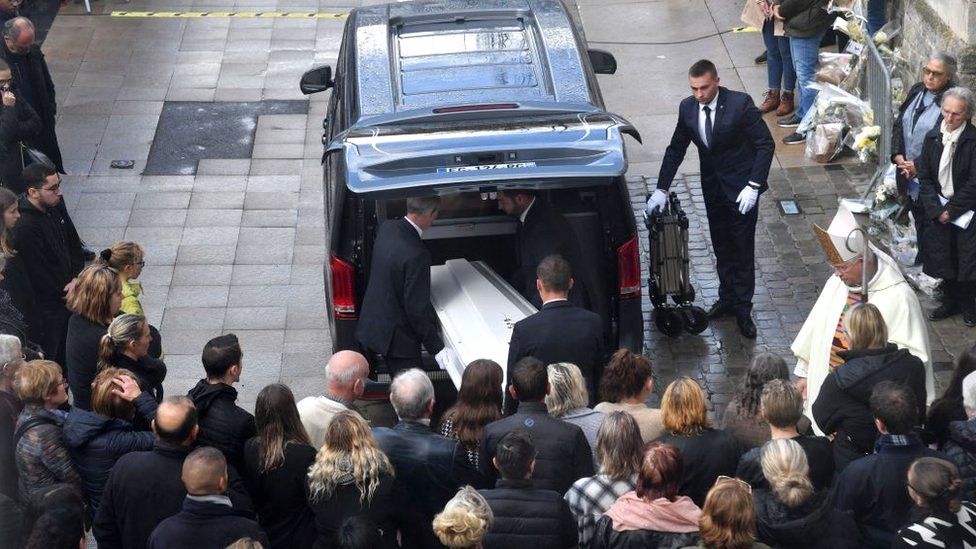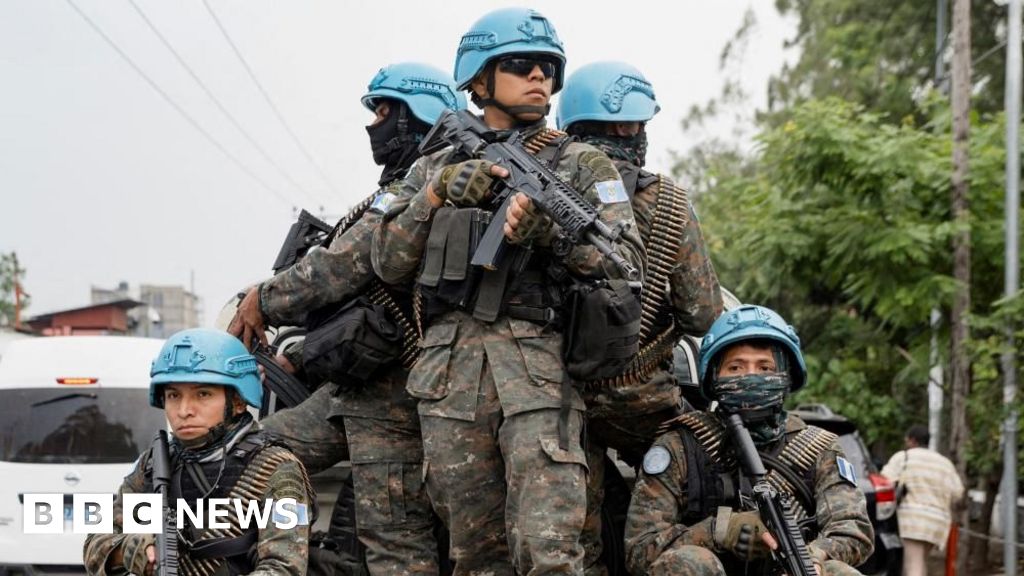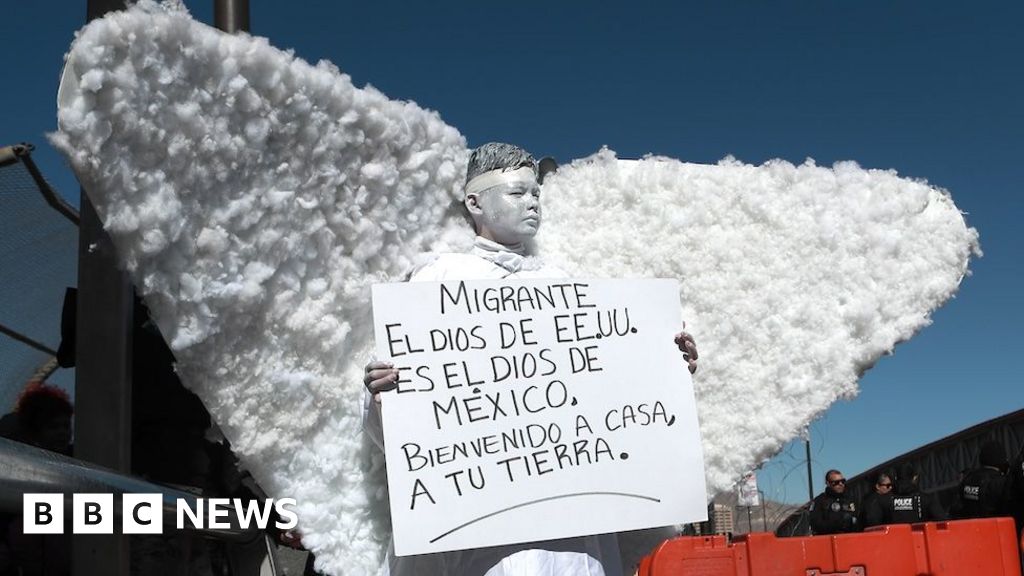ARTICLE AD BOX
 Image source, Getty Images
Image source, Getty Images
Mourners gathered for Lola's funeral on Monday, 10 days after her body was found outside her family's flat in Paris
By Lucy Williamson
BBC Paris correspondent
It was the moment the talking stopped - and the politicians fell silent.
The entry of a small white coffin into the church at Lillers reminded France what the past 10 days of shock and anger was all about.
Only the snapping of press cameras broke the silence as the body of 12-year-old Lola arrived, 10 days after it was found with marks of rape and torture outside her family's apartment in Paris.
The horrifying attack - on the softest of targets - has triggered hard political questions.
A 24-year-old Algerian woman known as Dhabia B has been charged with raping and murdering Lola after overstaying her visa and ignoring an order to leave France last summer.
And even before Lola's body was returned to her family, she became the property of France's anti-immigrant crusaders.
Her face bobbing on placards above the crowd at a far right gathering last week; internet domains in her name snapped up by backers of the virulent nationalist Eric Zemmour.
Lola's family last week demanded that people "immediately stop using the name and image of their child for political ends", both at public gatherings, and on the internet.
But, as one political commentator wrote in Le Figaro newspaper: "This tragedy is already a major political fact."
"The state killed me": Far-right demonstrators took the streets after the discovery of Lola's body
Since Lola's body was discovered, a survey for French television found that almost six out of 10 people thought those living in France without permission should be put in administrative detention.
Political reaction to this kind of crime is not new, says political scientist Jean-Yves Camus, but what is new is that Marine Le Pen's far-right National Rally party now has a large bloc of MPs in the National Assembly.
"Marine Le Pen lost the [presidential] election," Mr Camus told me, "but it's possible that she wins in 2027. And if the situation with regards to crime and illegal immigrants doesn't change, she really has a possibility of telling the French: 'Okay, you tried the conservative right, the mainstream, and they didn't do anything about it.'"
In the National Assembly last week, Ms Le Pen demanded: "What are you waiting for, to finally stop this out-of-control illegal immigration?"
In response, France's Prime Minister Elisabeth Borne told her to "show a bit of decency", while another minister accused France's right-wing Republican party of "using a 12-year-old girl's coffin as a [political] stepping-stone".
President Emmanuel Macron has described the killing as "extreme evil" and said it was "dizzying" to face what some in society were capable of.
But his government is facing awkward questions about its handling of people who do not have permission to stay in France.
The interior minister last year estimated that between 600,000 and 700,000 people are living in France illegally. And a Senate report found that more than 90% of expulsion orders are never complied with.
"We obviously have to do better," admitted government spokesman Olivier Véran.
Image source, Getty Images
Image caption,Marine Le Pen (centre) and her far-right National Rally party held a minute's silence outside the French parliament for Lola
Marine Le Pen has been careful this time to present herself as the measured and moderate anti-immigrant politician. She banned her party from joining a memorial organised by supporters of her hard-right rival Eric Zemmour, and instead opted for a minute's silence outside the parliament building.
Mr Zemmour - who sank from prominence after his failed presidential bid - has used the tragedy to turn the spotlight back onto his hard-line nationalist agenda, coining a new crime of "Francocide" to describe Lola's murder, based on his opinion that she was targeted because she was French.
"At least he's putting words to the problem," said Brieuc du Halgouet, an insurance advisor with three daughters who came to the Zemmour rally. "He's clearly linking immigration and violence, and this has been avoided by all the politicians before, at least most of them."
Geri, a 50-year-old hypnotherapist who was also at the rally, said: "Everyone who was in charge over the last 20 years is guilty. [They're] guilty for doing nothing; guilty for not kicking out people who are not supposed to be here - and people who vote for these politicians are guilty."
Jean-Yves Camus, the political scientist, said the case presented a "very potent cocktail for the far-right to use".
"The fact that the alleged perpetrator is a woman from Algeria, the crime is horrendous, the victim is a young girl and the perpetrator is maybe insane. Many people think, 'Why are we prepared to have such people on French soil?'"
He believes there is a specific historical sensitivity for France's right-wing parties in the fact that the suspect is Algerian.
France's withdrawal from its former colony in 1962 was vehemently opposed by far-right parties - including the party of Marine Le Pen, then led by her father.
And the violence and bitterness that accompanied the end of colonial rule have coloured relations ever since.
"There would be less of a reaction if she were from Morocco or Tunisia," Mr Camus said. "And these two countries are also more willing to accept their nationals when they're deported. The problem we have with Algeria is, when one of their nationals is deported, they just tell the French police: 'We don't want him'. So what do you do?"
Image source, Getty Images
Image caption,The town of Fouquereuil has created a book of condolence for mourners to sign
Last year, Paris cut by half the number of visas issued to Algerian nationals, in response to the low level of repatriations.
Since then President Macron has been working on repairing relations with Algiers. While Algeria - as Africa's largest gas supplier - has found new political influence as European countries look for alternatives to Russian gas.
Beneath the political debate, friends and family struggle to reclaim Lola's memory.
In her father's home village of Fouquereuil, where the family is sheltering, locals describe an "atmosphere of grief".
"I'm mum to a girl the same age," one woman told us. "And when I see the profile of [Lola] - little gymnast, secondary schooler, with friends, full of life - it's the same as my little girl. We're obviously affected."
But some of those who came to sign a book of condolence at Fouquereuil town hall on Friday, said the issue of political responsibility was turning silently in their minds.
"We have to respect the wishes of the parents not to exploit this politically," said Patricia, a pharmaceutical representative in Fouquereuil. "But I can also understand the need to act. Things really need to change in France. I am very tolerant, very open to the world, but there are some things we can't tolerate."
The answer, say France's right-wing politicians, is a tougher approach to illegal immigrants.
Their arguments for protecting France's economy and culture, now framed in terms of protecting one little girl.

 2 years ago
57
2 years ago
57








 English (US) ·
English (US) ·